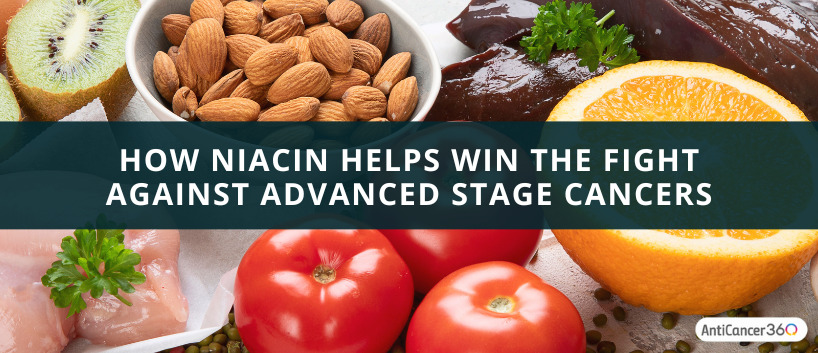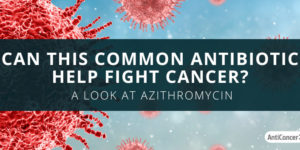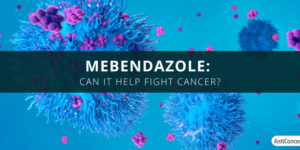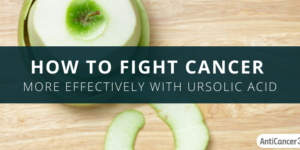You have likely found your way to this article because yourself or a loved one is in a fight against cancer. This disease can be a difficult obstacle to overcome, especially in advanced stages.
No doubt you are finding an overwhelming amount of information (much of it conflicting) as you look for the best means to put this thing into remission. At AntiCancer360 we specialize in helping cancer patients understand all of their options and utilize the most researched anticancer substances to win back their health. In this article we discuss one of the essential B-vitamins, Niacin, and how it can be useful in the fight.
What is Niacin?
Niacin is one of the B class vitamins, also known as vitamin B3. It is typically found in two available forms: nicotinic acid (pyridine-3-carboxylic acid) and nicotinamide (niacinamide or pyridine-3-carboxamide). There are other forms, but for the purpose of our discussion, these are the two main ones to focus on.
Both of these forms of B3 are taken in by cells of the body and converted into the metabolically active form, coenzyme nicotinamide adenine dinucleotide (NAD). There are more than 400 enzymes that require NAD to catalyze reactions in the body, which is more than for any other vitamin-derived coenzyme. As it sounds, it’s pretty important for our health.
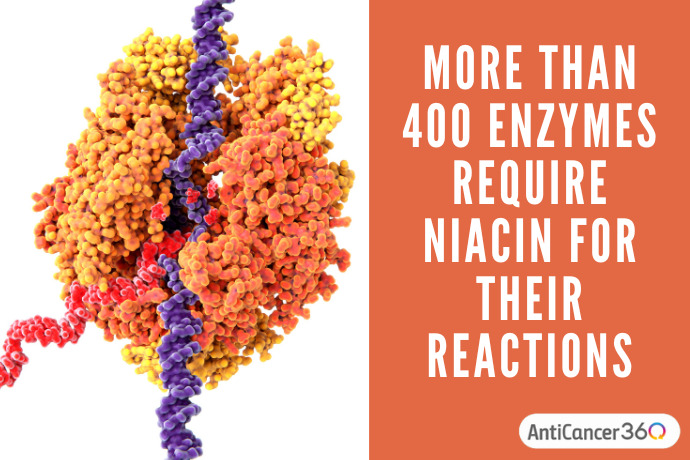
When it comes to cancer, we have discovered that niacin helps maintain the integrity of genetic material, control of gene expression, cellular communication, and plays a major role in maintaining cellular antioxidant function; all of which are critical components of preventing damaged cells that can become cancerous [1].
In other words, it is very helpful for preventing cancer from forming. If this is your goal, maintaining a diet rich in niacin should be sufficient. Here is a list of the highest containing niacin foods to focus on.
But what about once someone already has cancer?
Niacin Improves Survival Rates
Not only has niacin been demonstrated to help prevent cancer, there is also research showing that higher levels of niacin intake are linked to increased survival rates among cancer patients [2].
It seems that overall, studies indicate that NAD helps prevent mutated cancer cells from surviving; or in other words, a niacin deficiency promotes the survival of mutated cancer cells [3]. Therefore, it makes sense to ensure adequate niacin intake, especially if you have cancer (see the link to highest niacin foods above).
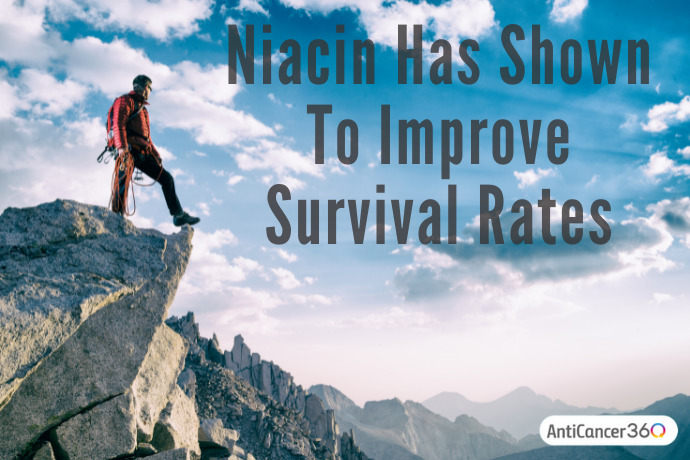
But let’s be honest, many cancer patients have difficulty eating and many folks in general can experience a difficult time being diligent about dietary nutrient intake. For this reason, supplementing with niacin makes sense for a lot of people. More on this at the end of the article.
The Mechanisms for Which Niacin Helps Defeat Cancer Cells
It Alters the Way in Which Cancer Cells Metabolize Sugars
Niacin has been shown to play a role (along with riboflavin and CoQ10) in restoring oxidative phosphorylation in animal models of breast cancer, a biochemical process often impeded in cancer cells [4].
It Impacts Protein Metabolism
Another study in breast cancer cells showed that the enhancement of mitochondrial complex I activity inhibits tumor growth and metastasis through regulation of the tumor cell NAD redox balance, mTORC1 activity, and autophagy. Conversely, reduction of NAD levels rendered tumor cells more aggressive and increased metastasis in a mouse model [5].
It Changes Fat Metabolism
In humans niacin is shown to reduce the oxidation of fatty acids and lowers cholesterol and lipids in the blood [6]. This is the effect responsible for niacin being used in the world of cardiology. It has a long track record of this effect and can lower risk factors for heart disease as well. In cancer, this gives us another way to prevent cancerous cells from consuming fat for fuel (to better starve them out) and it lowers the damaging free radicals that can lead to more mutated cells.
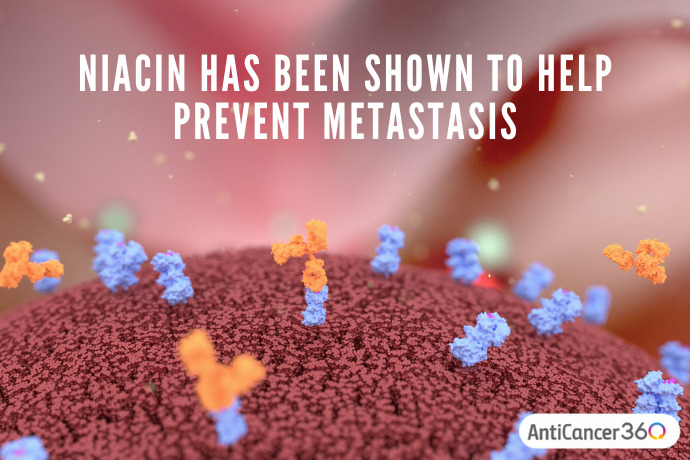
Anti-inflammatory Effects
Niacin seems to act directly on monocytes by inhibiting toll-like receptor (TLR)-4 (leading to decreased NF-κB) and TLR-2 induced expression and secretion of pro-inflammatory cytokines TNF-α, interleukin-6, and MCP-1 in human monocytes. This leads to an anti-inflammatory effect that is believed to help with cancer survival [7],[8],
Helps Inhibit Metastasis
The major cause of death in many cancers is when a tumor becomes metastatic, meaning it spreads to other parts of the body. Niacin has been shown to help prevent metastasis in liver cancer [9], breast cancer [10], and colon cancer [11]; especially when combined with other therapies.
Niacin Appears to be Especially Useful as Part of an Integrative Protocol
There is research showing that when niacin is added to other treatments there are better outcomes. One example is in a mouse model of glioblastoma, a brain tumor with poor outcomes due to resistance to chemoradiotherapy treatments (such as commonly used temozolomide).
The researchers observed reduced tumor volume and prolonged survival when giving the mice niacin. What’s even more promising, is that when they combined niacin with temozolomide, it produced even better results.
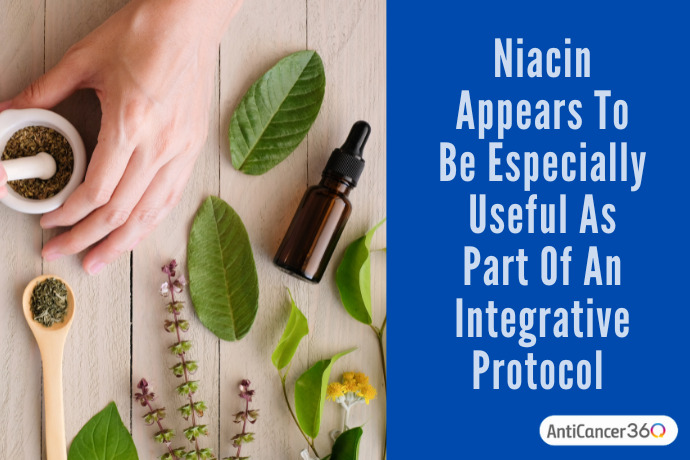
The combo prolonged survival in a mouse model by at least fivefold [12]! The researchers attributed this to the immune enhancing effects of niacin, but could there be another mechanism involved here?
Niacin as a vasodilator to get treatments into tumors?
Of the two main types of niacin on the market, the less expensive one that has been around longer is called nicotinic acid. This compound is famous for creating what is called “the niacin flush” (something that does not happen with the niacinamide that is more commonly found in supplements these days).
This flushing effect is a result of blood vessels expanding, especially within the skin due to the high concentration of Langerhans cells [13].
Aside from this somewhat unpleasant effect in the skin, it appears that niacin also dilates blood vessels in the small vessels of the limbs [14], the eyes [15], and presumably all over the body, as it plays an integral role in nitric oxide production [16] (the main dilator of blood vessels).
Some of the newest research on cancer is showing that a major obstacle to treating tumors is that they distort the blood vessels that feed them and make it difficult to deliver treatments into the tumor cells [17]. It is very likely that one of the reasons niacin helps treatment outcomes is that it expands the blood vessels and gets the treatments into the tumor, where they have their greatest impact.
Niacin Alleviates Side Effects of Conventional Treatments
It is common for chemotherapy treatments to cause a deficiency in niacin [18]. As discussed above, niacin deficiencies lead to worse outcomes in many cancers. Niacin is part of over 400 enzymatic reactions and is likely the cause of some of the side effects of conventional treatments.
Symptoms of niacin deficiency include: fatigue, inflammation in the mouth, constipation, nausea/vomiting, memory impairment, disorientation, confusion, depression, etc [19].
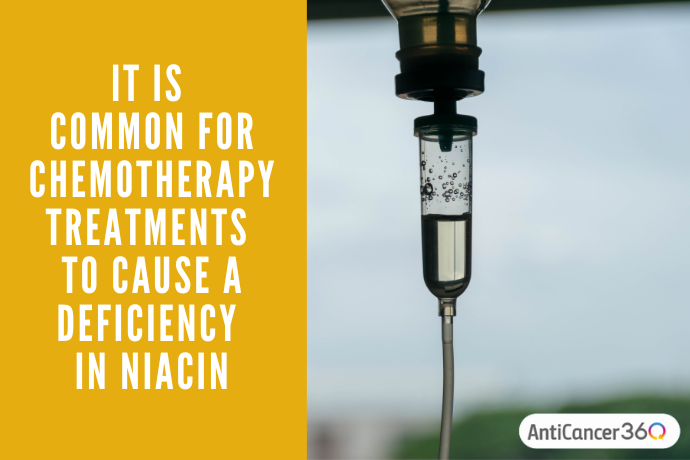
There are also some studies which have proven that niacin supplementation can protect a cancer patient’s bone marrow cells from the side effects of genotoxic chemotherapy drugs [20]. It therefore makes sense to consider niacin supplementation for anyone undergoing chemo treatments.
Cautions and Controversy
Utilizing niacin within the world of cancer is not without controversy, however. There has been some research where cancers got worse when adding niacin.
One study in 2016 showed that in mice, both anti-tumor and pro-tumor molecules were generated when giving them nicotinamide mononucleotide (NMN, a precursor to NAD+) [21]. This study suggests that during chemotherapy NMN might encourage senescence, which means the cancerous cells stop growing.
However, there was also evidence of relapse which might be fueled by NAD+ feeding into the metabolic pathways that cancerous cells utilize to sustain rapid growth.
Researchers are considering the link between the NAMPT enzyme (which increases NAD+ levels in cells). Certain tumors that express higher amounts of NAMPT may get worse from increased amounts of niacin. These types of tumor cells do appear to be destroyed when blocking this enzyme [22]. In fact, researchers are encouraged by and are pursuing methods to block NAMPT as a novel cancer treatment [23].
So what do we do? Is niacin of benefit or will it make things worse?
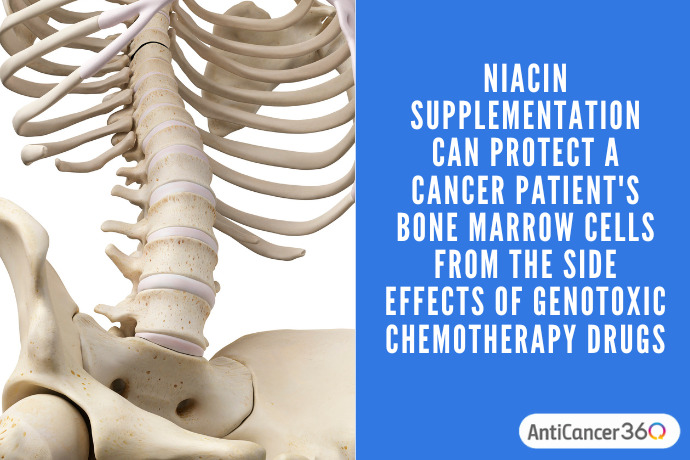
Based on the current research, it seems that the most practical thing to do would be to test for mutations in the NAMPT enzyme prior to considering any supplemental niacin therapies. If this enzyme is elevated in a cancer type, niacin supplements should be avoided. If this is not part of the tumor pathology, it is reasonable to believe that niacin therapy would be of benefit.
Furthermore, it seems that niacin is particularly helpful during chemotherapy (and likely other cytotoxic therapies) but may become a problem for relapse if used in the long-term. There are still some unanswered questions about niacin and cancer and so it makes the most sense to proceed with caution.
Proper Form and Dosing to be an Effective Addition to Anticancer Protocols
As there are three major forms of niacin that can be used as supplements it is important to know which one to use and in what dose to be effective.
This paper on the use of niacin in preventing heart disease has summed it up succinctly (I added explanations in parenthesis where necessary):
“Niacin is currently available in 3 formulations (immediate release – nicotinic acid, extended release – niacinamide, and long acting – also known as extended release – nicotinic acid bound to a compound so it is release slowly), which differ significantly with respect to their safety and efficacy profiles.
Immediate-release niacin is generally taken 3 times a day and is associated with adverse flushing, gastrointestinal symptoms, and elevations in blood glucose levels (at 1.5g/day).
Long-acting niacin can be taken once daily and is associated with significantly reduced flushing, but its metabolism increases the risk of hepatotoxic (liver toxic) effects.
Extended-release niacin, also given once daily, has an absorption rate intermediate between the other formulations and is associated with fewer flushing and gastrointestinal symptoms without increasing hepatotoxic risk.”
Yes, flushing can be unpleasant, and nicotinic acid can become toxic if used in high doses over long periods, however, it is also the one that dilates blood vessels and has the potential to improve cancer treatment effectiveness.
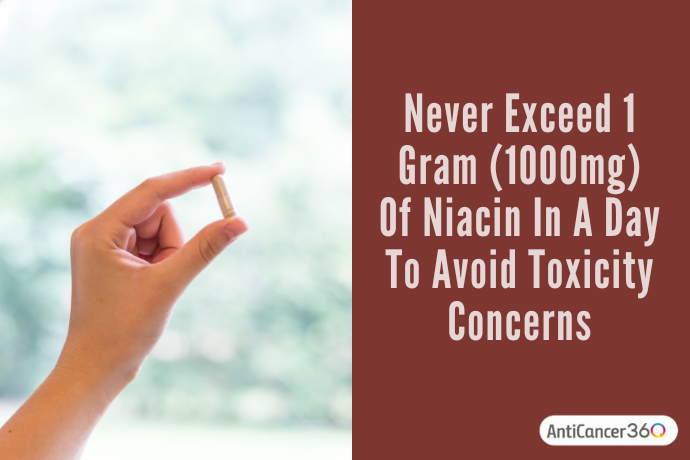
We also do not want to see elevations in blood sugar as one of our common strategies for deterring cancer cells is to starve them of glucose. So, we can surmise that it is important to keep the dose of niacin below 1.5 grams per day.
Taking a single capsule of niacin strong enough to induce a flush with a treatment should be enough to benefit from the vasodilatory effects and increased delivery of the anticancer agent to the tumor. This can be seen as low as 100 mgs of niacin.
It therefore makes sense to start with this low dose, taken anytime an anticancer treatment is consumed, and only increased if the flushing effect goes away over time.
Never exceed 1 gram (1000mg) of niacin in a day to avoid toxicity concerns.
One last consideration, niacinamide may be the preferred form of niacin in certain scenarios, as it is not dependent on glutamine for the synthesis of NAD+ and glutamine restriction is helpful in treatment of cancer [24].
Niacinamide does not cause the flush and is often found in “flush free niacin” products. So we do lose out on the novel method of improving delivery of anticancer agents to tumors, but this form will still help correct niacin deficiencies associated with worse cancer prognosis.
So What Do I Do?
Whether to use niacin in your anticancer approach and determining the best form and dosing of niacin is going to be dependent on your goals, current anticancer strategy, and cancer type. It is best to consult with integrative anticancer specialists in order to know the best form and dose of niacin to use in your specific situation.
Are You A Good Candidate For Our Program?
If you’d like to learn more about the AntiCancer360 approach and see if we can help you… please watch our free online webinar to learn more about our approach. Then at the end, you’ll be able to schedule a free call with someone from our team so that we can discuss your case in more detail.
Derrick Schull is a naturopathic doctor with a decade of experience helping others integrate the best natural and alternative interventions to meet their health goals. He has extensive experience in anticancer strategies, gut health, and brain health. As part of the AntiCancer360 team, Dr. Derrick coordinates your case-specific research, lab tests, oncology treatment info, and supplement-drug interactions to design a comprehensive program that’s tailored to your particular case.

